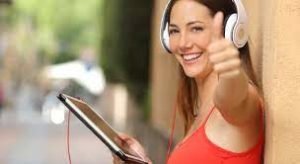In Listening Test 7, you will hear 4 audio recordings and answer questions 1-40. You will hear the recordings only once.
Section 1 is a conversation between 2 friends about their new school.
Section 2 is an introduction to some London parks.
Section 3 is Bob asking questions to 3 students about a survey.
Section 4 is a monologue about Oxford and Cambridge Universities.
Section 1
Questions 1-10
Choose the correct answers A-C and write them in the blank space on your answer sheet.
John thinks the new school is ____________
A worse than the old one
B better than the old one
C the same as the old one
Example: B
Q.1
Choose the correct answers A-C and write them in the blank space on your answer sheet.
1 Joan thinks John should start his article by ____________
A describing the new school’s buildings
B comparing the new school with the old school
C introducing the new school’s headmaster
Q. 2
Write ONE WORD ONLY for your answer
2 What is the name of the French teacher at the old school?____________
Q.3-4
Choose TWO correct answers A-E and write them in the blank space on your answer sheet.
The new headmaster told the school____________
A they must study hard for their futures
B his ideas on education
C he is progressive
D keeping fit is good
E exercising the brain makes it more creative
Q. 5
Complete the following sentence with TWO WORDS
5 The headmaster said exercise can “put you in a ____________”.
Q. 6-7
Write NO MORE THAN TWO WORDS for each answer
Name two types of equipment Joan says is in the gym
6 ____________
7 ____________
Q. 8
Choose the correct answers A-C and write them in the blank space on your answer sheet.
8 John has been to the fitness centre
A every day for two weeks
B on alternate days for two weeks
C most days for two weeks
Q. 9-10
Complete each sentence with TWO WORDS
9 Joan is doing a ____________
10 The old music teacher’s name is ____________
Section 2
Questions 11-20
Q. 11
Complete the following sentence with TWO WORDS
11 The parks in London were established by order of a King or Queen of England are called ____________
Q. 12
Choose the correct answers A-C and write them in the blank space on your answer sheet.
12 King Henry VII got the land for Hyde Park from ____________
A religious people
B his family
C the government
Q. 13-14
Complete the following sentence with NO MORE THAN TWO WORDS.
Today’s World Expos date back to the 13 ____________ in 14 ____________
Q. 15
Choose the correct answers A-C and write them in the blank space on your answer sheet.
15 The speaker says people who like Hyde Park include ____________
A people who live near the park
B visitors
C university students
Q. 16-20
Write NO MORE THAN THREE WORDS for each answer
16 What is the name of the place where people gather in Hyde Park to argue? ____________
17 What was the name of Queen Victoria’s husband? ____________
18 Westminster Palace is known today as the ____________
19 At what time on Sundays does the Queen’s lifeguard change at Whitehall? ____________
20 Greenwich Park contains the National Maritime Museum, the Queen’s House, the Old Royal Observatory, and the ____________
Section 3
Questions 21-30
Q. 21-22
Choose TWO correct answers A-E and write them in the blank space on your answer sheet.
For his major, Bob can’t decide between and ____________
A sustainable development
B economics
C environmental studies
D resource management
E sociology
Q. 23
Answer the following question in ONE WORD
23 What type of questions will Bob ask? ____________
Q. 24-25
Choose TWO correct answers A-E and write them in the blank space on your answer sheet.
Jed thinks ____________
A global warming is a false alarm
B some environmental groups care more about pandas than people
C global warning is very serious
D climate change is partly caused by human activity
E Eenvironmental groups are objective
Q. 26-28
Choose THREE correct answers A-F and write them in the blank space on your answer sheet.
Sue says ____________
A she has taken an environmental economics course
B Jed likes tape recorders
C crop yields drop when average temperatures exceed 30 degrees
D Jed should learn what he is talking about
E terrorism is the most serious global problem
F species could disappear with global warming
Q.29-30
Complete the following sentences with TWO WORDS for each answer
29 Ann says farmland could be ruined by the intrusion of ____________
30 Jed’s major worry is worldwide ____________
Section 4
Questions 31-40
Q. 31-35
Insert the letter, A-E in Column 2 to the corresponding event or date in Column 1
| 31 1167 ____________
32 A historian gave a lecture to top Oxford teachers ____________ 33 1190 ____________ 34 13th century ____________ 35 Records of teaching at Oxford ____________ |
A Oxford University’s tradition of international exchanges started.
B English students banned from a French university. C Merton College founded. D 1188 E 1096 |
Q. 36
Complete the following sentence with A NUMBER
36 A total of Oxford colleges accept both men and women ____________
Q. 37-38
Complete the following sentence.
Write NO MORE THAN THREE WORDS for each answer
In the bar chart below, Column A represents Oxford University students from
37 ____________ and Column C students from 38 ____________
Q. 39
Choose the correct letter, A-C
39 King Henry III ____________
A said Cambridge students had to make their own accommodation arrangements
B ordered hostels to be built for the students
C recognized Cambridge as a seat of learning
Q. 40
Answer the question in ONE WORD AND A NUMBER
40 When did Cambridge University start to award degrees to women? ____________
Answer
[restrict paid=true]
Section 1
| 1. | B |
| 2. | Smith |
| 3. | B |
| 4. | D |
| 5. | better mood |
| 6. | exercise bikes |
| 7. | rowing machines |
| 8. | B |
| 9. | video project |
| 10. | Clark |
Section 2
| 11. | royal parks |
| 12. | A |
| 13. | Great Exhibition |
| 14. | 1851 |
| 15. | A |
| 16. | Speakers’ Corner |
| 17. | Albert |
| 18. | Houses of Parliament |
| 19. | 10 am |
| 20. | Royal Naval College |
Section 3
| 21. | C |
| 22. | E |
| 23. | open-ended |
| 24. | A |
| 25. | B |
| 26. | C |
| 27. | D |
| 28. | E |
| 29. | saltwater |
| 30. | economic slowdown |
Section 4
| 31. | B |
| 32. | D |
| 33. | A |
| 34. | C |
| 35. | E |
| 36. | 38 |
| 37. | other European countries |
| 38. | North America |
| 39. | C |
| 40. | late 1940s |
[/restrict]















